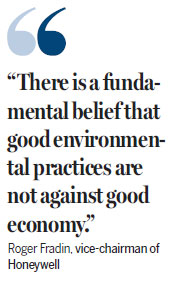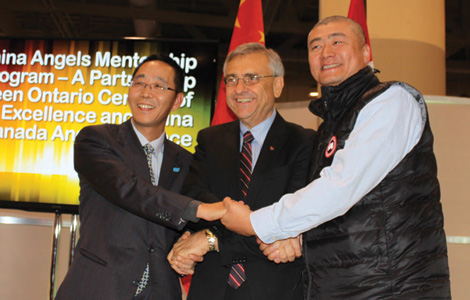Honeywell to trim energy usage
Updated: 2015-05-01 09:57
By Wang Ying in Shanghai(China Daily USA)
|
|||||||||
Honeywell is partnering with a local company to launch a new energy efficiency platform in Shanghai, putting China among the first batch of countries where the program is being tested.
The Fortune-100 diversified technology and manufacturing company will work with real estate developer Shanghai New Changning Group on 30 commercial buildings in Changning district, it said. The two sides have already signed an MOU to work together.
According to the deal, all of the buildings will have automated-demand-response systems installed. These are designed to conduct real-time monitoring of the smart grid and strike a balance between energy loads and consumption.
They are expected to reduce the total heating, cooling, lighting and computing loads by 15 percent for industrial use and 20 percent for commercial use, the company said.
"The automated-demand-response system allows the power company to reduce the energy load in the commercial buildings and factories without causing brownouts or blackouts," said Roger Fradin, vice-chairman of Honeywell.
"There is a balance between the amount of energy being generated and the amount of energy being consumed."
This is Honeywell's second project in China after a similar demo project got off the ground earlier in Tianjin.
More than half of China's 1.4 billion population live in cities. An additional 350 million are expected to bolster the country's unprecedented urbanization drive by 2030, which will create huge demand for better ways to consume energy, according to a report issued by McKinsey & Co.
As more people purchase air conditioners, flat screen TVs and modern kitchen appliances, energy consumption will rise and the threat of shortages grow.
"It's not a China-specific issue, but an issue around the world," said Fradin.
He said energy efficient solutions will help to manage demand for electricity rather than simply ramping up supply.

Such measures can also save costs as there is considerable waste involved in satisfying peak demand due to the amount of energy generated that goes unused. Reducing power usage also makes modern lifestyles more sustainable, the company said.
China now makes up 6 percent, or $2.4 billion, of Honeywell's global revenue. In 2013, China became its largest market outside of the United States.
Sales revenue in China has jumped 500 percent over the last decade, outpacing the domestic economy's four-fold growth, Fradin said.
"We are confident of continuing our high-speed growth in China in the coming years," he added.
More than 50 percent of Honeywell's products and solutions are linked to clean energy and energy efficiency, which fits well with the Chinese government's demand to cut carbon dioxide emissions and promote efficient energy usage.
Turbo-charging technology is another example of Honeywell's energy saving products. This has been proven to reduce vehicles' fuel consumption by between 20 percent and 40 percent. It can cut emissions by up to 30 percent.
"It allows you to get the performance of a bigger engine on a small engine, with good driving performance but much lower emissions," said Fradin.
Fradin is a member of the first US presidential mission to expand bilateral cooperation in the realm of clean energy.
Led by Secretary of Commerce Penny Pritzker and Deputy Secretary of Energy Elizabeth Sherwood-Randall, it aims to help US companies launch or increase their business in China in terms of energy efficient technologies, clean air and water technologies, and green buildings.
"We are here in China as part of the Obama administration's first-ever presidential trade mission," said Pritzker during a recent forum at the China Executive Leadership Academy in Pudong, Shanghai.
"We brought 24 US firms with us," she said. "(They) not only represent the gold standard in clean technology, but are also examples of the American spirit of innovation and entrepreneurship."
"There is a fundamental belief that good environmental practices are not against good economy," said Fradin.
Such cooperation is a win-win strategy as it will help China cut its emissions and pollution levels while winning more business from US companies, said Song Guoyou, a professor at the Center of American Studies at Shanghai's Fudan University.
He said such cooperation could add $100 billion to the combined GDP of China and the US in the future.
wang_ying@chinadaily.com.cn

 Across America over the week (from April 24 to 30)
Across America over the week (from April 24 to 30)
 Across Canada (May 1)
Across Canada (May 1)
 China's top 10 GDP provinces in Q1
China's top 10 GDP provinces in Q1
 Photos capture marvelous landscapes of China
Photos capture marvelous landscapes of China
 Mass exodus from Kathmandu
Mass exodus from Kathmandu
 Running on water: a nearly impossible feat
Running on water: a nearly impossible feat
 Ten photos you don't wanna miss - April 30
Ten photos you don't wanna miss - April 30
 'Comfort women' survivor attends protest of Japan PM
'Comfort women' survivor attends protest of Japan PM
Most Viewed
Editor's Picks

|

|

|

|

|

|
Today's Top News
The 'nightmare' everyone saw coming
Abe betrays history's conscience
Vancouver property developer identified as Chinese fugitive: report
Freddie Gray tried to hurt himself in police van
China trainmakers seek control of Bombardier's rail unit
New rich set sights on tech, media and telecom sectors
US rapped for stance on Japan
Obama, Abe talk much about China
US Weekly

|

|







